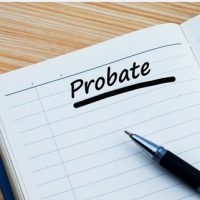Do You Want to Avoid Probate?

Probate is the process of validating a will and then paying off the estate’s creditors in an orderly fashion. Once creditors have been paid, the estate’s personal representative will distribute property according to the will or, if there is no will, according to Florida’s intestacy rules. Probate is overseen by the probate court, which is empowered to hear disputes involving the validity of the will or creditor claims.
The probate process can be cumbersome and time-consuming, which might not mean much to a person writing a will. After all, you’ll be long gone by the time your will lands in probate court. But if you want to protect your loved ones, you should consider avoiding probate.
What Are the Benefits of Avoiding Probate?
Why should a person drafting an estate plan care about passing assets outside probate? There are several reasons.
One, your family will be able to access funds to live on much faster. Once you die, your personal representative will collect and safekeep all your assets. This includes money in a bank account. Your spouse or children can’t take your debit card and start pulling money out of your account, even for essentials like groceries. If you are worried about them having enough to live on, you should consider non-probate transfers.
Also, avoiding probate can keep the overall costs down. This preserves assets in your estate. Ultimately, your beneficiaries will receive more.
Lastly, probate is a public process. Your will is public, and you might want to pass your assets in a more private fashion. Passing assets outside of probate and accomplish this goal.
How Can You Avoid Probate?
There are different techniques for avoiding probate. For example, you might pass assets to your heirs in the following manner:
- Joint ownership of property. You can own real estate as joint tenants with right of survivorship. This means that when one owner dies, the other owner automatically owns the entire property. You can also create a joint bank account.
- Payable on death accounts. You can identify someone to inherit your financial account on death. This is another option for a bank account.
- Life insurance. You name the beneficiary of your life insurance policy on the policy itself. This means it does not pass through probate.
- Retirement accounts. You also identify beneficiaries on your retirement account policy.
Another popular technique is to create a trust. You can put property into trust and name a trustee, who manages the property, and beneficiaries. You also leave instructions for what to do with the trust property, such as distribute it at your death. There are many types of trusts, which you should discuss with an estate planning attorney.
These are only some of the more popular ways to avoid probate. There are others. Please schedule a meeting with Millhorn Elder Law Planning Group today. Our team of probate lawyers in The Villages has helped many people avoid probate, and we can go into more detail about your options. Contact us today by calling 800-743-9732 to schedule a free consultation.
https://www.millhorn.com/what-happens-to-a-debt-after-death/


